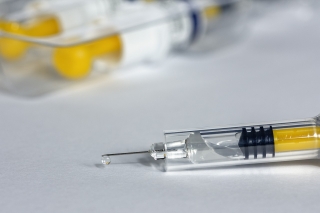Pfizer, BioNtech Say COVID-19 Vaccine is More than 90% Effective
For 10 months, the US and the world have wondered and watched and waited for when an effective Covid-19 vaccine will arrive. Pfizer said Monday morning that it has. The Big Pharma and its partner BioNTech said that, on an interim look, their vaccine was at least 90% effective in preventing symptomatic Covid-19 cases. If the data hold up, it would mean a pandemic inoculation vastly more effective than anticipated throughout 2020, when experts warned that the first vaccines could be as low as 60% or 70% effective and the FDA indicated it was willing to approve jabs that surpassed the 50% mark.
Pfizer said it will submit for an emergency use authorization around the third week of November, when it surpasses a safety benchmark set by the FDA. FDA officials have indicated they could move to enact an EUA at record speed, although not before convening an advisory committee to review Pfizer’s data.
A data safety and monitoring committee didn’t flag any major safety issues, although the company still has to reach the median two months of followup the FDA has required Covid-19 vaccine makers reach in their Phase III trials.
New questions arise
A sea of questions still looms for the mRNA candidate, though. It’s not clear how well the vaccine prevents infection or severe cases of Covid-19 — an issue raised at the recent FDA advisory committee on vaccines — and no one knows how long protection will last. The data have also not been peer-reviewed, drawing criticism from activists who have called for companies not to release Covid-19 results by press release.
Public Citizen, the left-leaning Washington-based NGO, called it “bad science,” noting the lingering unknowns on safety and severe cases.
“Crucial information absent from the companies’ announcement is any evidence that the vaccine prevents serious COVID-19 cases or reduces hospitalizations and deaths due to the disease,” Michael Carome, the NGO’s lead health researcher, said in a statement. “More importantly, critical safety data from the phase 3 trial of the Pfizer and BioNTech vaccine is not yet available.”
Results are hopeful
Still, the results provide a major boon for hopes that vaccines can eventually help curb the pandemic in the US and worldwide. Moderna, the vaccine developer likely to readout next, also uses mRNA, a technology that had never been tested in large scale trials before 2020, and virtually all major candidates target the coronavirus spike protein that Pfizer targets.
Even if the vaccine holds up and is authorized by the FDA, though, it will still be in short supply. Pfizer has said that around 50 million doses of the vaccine could be available by the end of the year, with 1 billion doses available in 2021. The vaccine requires two doses to be effective.
The 90% figure comes from an analysis of 94 confirmed cases of Covid-19 across both arms of the company’s Phase III trial, which has enrolled 44,000 volunteers to date. The company had originally planned to conduct its first analysis at 32 cases, prompting CEO Albert Bourla to insist they’d know if it worked by October, but after discussions with the FDA, agreed to look after 62 cases. By that time, though, 94 cases had already accrued.
Milestone
In a statement, Bourla cast the results as a major milestone in the fight against the pandemic, noting that it comes at a time when cases are surging to record levels. Those surging cases likely helped Pfizer reach the efficacy data faster than they would have if the virus was under control.
“Today is a great day for science and humanity,” he said. “The first set of results from our Phase 3 COVID-19 vaccine trial provides the initial evidence of our vaccine’s ability to prevent COVID-19. We are reaching this critical milestone in our vaccine development program at a time when the world needs it most with infection rates setting new records, hospitals nearing over-capacity and economies struggling to reopen.”
Although Pfizer has indicated they would want to unblind the study once results were in, the company said that it will continue until it reaches 164 confirmed cases. At that point, however, it’s unclear whether the FDA would want them to continue the blinded study, which would allow them to collect better long term safety data.
The announcement marks a major success for Bourla, who was promoted to CEO two years ago to re-energize a slow-footed American giant and who arguably bet more on his company’s Covid-19 vaccine efforts than any other executive on the planet. Teaming with the German mRNA biotech BioNTech, he eschewed government funding on the principle that they could move faster alone. Asked by Time in July what would happen if the FDA rejected the vaccine they invested over a $1 billion in, he said: “We will just have to write it off and call it a day.”
Pfizer, a company that first made its mark mass-producing penicillin during World War II, could now stand to reap both the prestige and financial windfall of the first effective Covid-19 shot. The government has agreed to pay the New York pharma $1.95 billion for 100 million doses of its vaccine. Projections for future sales vary greatly, but SVB Leerink pegged them for over $3 billion in 2021 and JP Morgan has put that figure as high as $5.5 billion.
With the world likely facing a shortage of coronavirus vaccines for several years to come and vaccinated people likely to need booster shots, the product could be a blockbuster for a considerable time.
Source: Endpoints News, HollandBIO

